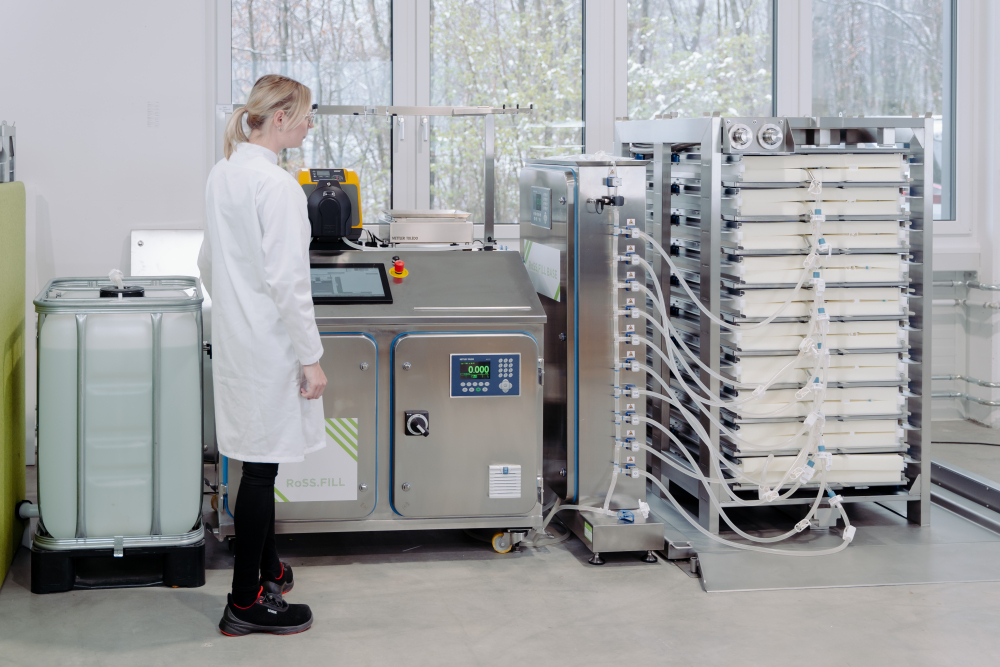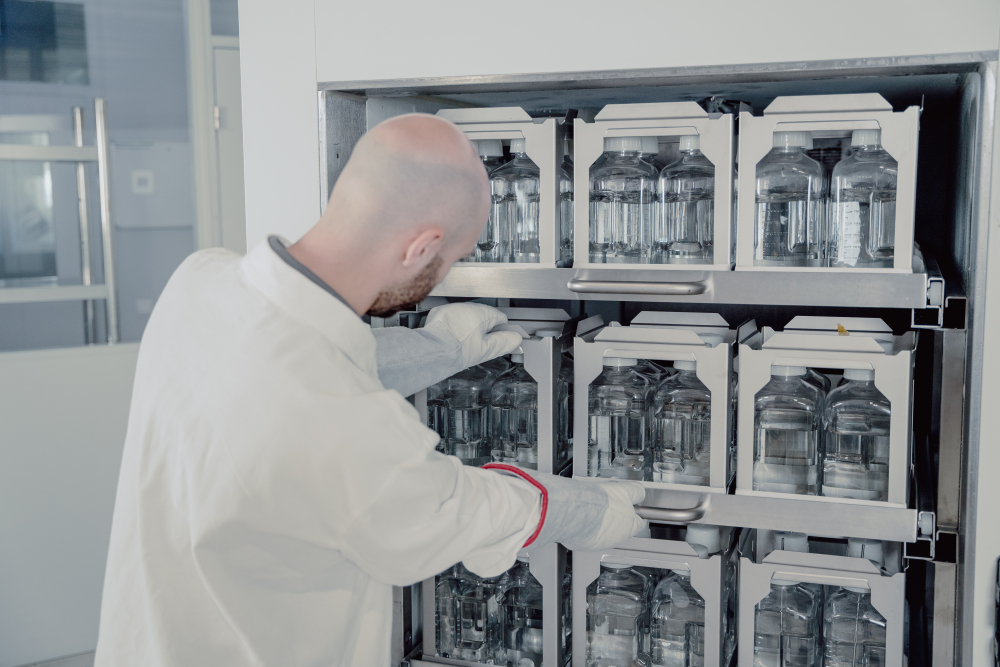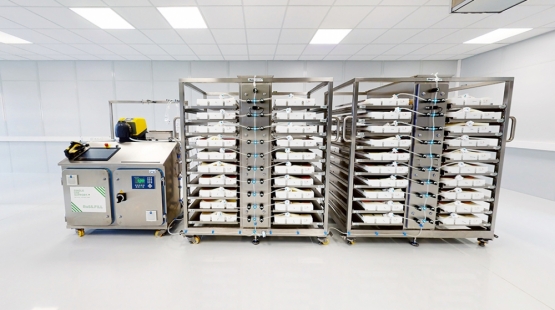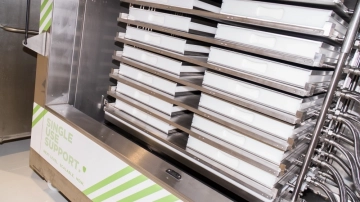Oligonucleotide manufacturing – challenges & solutions
Table of contents
ShowOligos - what are they?
Oligonucleotides (also referred to as oligos) are short nucleic acid sequences, made up of a strand of nucleic acid, either DNA or RNA. They represent an increasingly important growth area for the biopharmaceutical manufacturing industry.
Oligonucleotides can be used for a variety of research, diagnostics, and therapeutic applications. For example, oligos can be readily manipulated and then used as therapies that change the expression of disease-causing proteins. Most oligonucleotides currently on the market were designed and licensed for the treatment of rare diseases. Increasingly, however, oligonucleotides are coming to market that are licensed for the treatment of common clinical conditions, such as cardiovascular diseases [1]. The potential benefits this class of drugs offers are enormous, but there are some major challenges that the biopharmaceutical industry will need to address if the production of oligonucleotides is to be scaled up to the levels necessary to treat vast numbers of people [2]. In this article, we explore some of these challenges as well as potential solutions.

Challenges in oligonucleotide manufacturing
There are several challenges in relation to the manufacturing of oligos at scale. These include the scalability of the manufacturing process itself, cost and efficiency issues, and concerns relating to sustainability.
Scalability
Solid-phase synthesis is a method of chemical production that synthesizes molecules in a step-by-step manner while they are covalently bound to a solid support material. It is an approach that has long been used for the synthesis of oligos for research purposes and in small-scale manufacturing. While solid-phase synthesis is effective for these purposes, it is difficult to scale up this method to produce large quantities of a compound.
As increasingly long oligos are sought, particularly those required for therapeutic applications, such as antisense oligonucleotides [3], difficulties in synthesis become more pronounced. The limited space on the solid support leads to incomplete coupling reactions and misincorporation of nucleotides, resulting in a higher incidence of sequence errors. These errors can have a major impact on product quality and batch consistency, which are critical for regulatory considerations.
Despite the growing interest in oligonucleotide-based therapeutics, global manufacturing infrastructure remains limited. This gap in global manufacturing capacity means that many manufacturers lack the specialized capabilities required to scale up oligonucleotide manufacturing while also maintaining the stringent quality assurance and quality control processes needed for the manufacture of clinical-grade oligonucleotides.
Cost & Efficiency
Oligonucleotide manufacturing, particularly at a commercial scale, faces considerable efficiency challenges. These challenges are driven by both cost and technical factors.
The high cost of the raw materials required for oligonucleotide synthesis is one of the primary drivers of the high manufacturing costs. High-purity reagents and specialized solvents are needed to ensure the fidelity of nucleotide incorporation during synthesis. Longer and more complex oligos require correspondingly more expensive reagents.
There are various inefficiencies in the manufacturing process for oligos, with excess materials needed to initiate and drive reactions to completion. Solid-phase synthesis has inherent limitations at each step, with each nucleotide addition resulting in a slight decrease in reaction yield. This leads to cumulative losses in product as oligos grow longer. This inefficiency not only reduces yields but also results in the waste of expensive reagents, further adding to the overall costs.
These inefficiencies are compounded by the oligonucleotide purification stage, which is a major bottleneck and accounts for approximately 50% of the materials used during oligo manufacture [2]. It is essential that any impurities are removed as their presence in any final product is of concern, both in terms of product quality and product safety [4]. The solvents and other chemicals used in oligo synthesis and purification processes are often toxic and require careful disposal. Complying with environmental regulations and the appropriate management of waste materials add considerable operational costs for manufacturers, especially those involved in large-scale production.
Sustainability
The inefficiencies outlined above, including the need for large volumes of reagents and the cost of managing waste materials, contribute to the current overall lack of sustainability in oligonucleotide manufacturing.
There are some aspects of oligos and their manufacture that are in line with the principles of “green chemistry.” For example, oligos generally have low toxicity and break down into naturally occurring degradation products [2]. However, there are some inherent features of oligonucleotide manufacturing that are difficult to overcome with green chemistry solutions, such as the large amounts of organic and aqueous waste generated during their synthesis and purification [2]. Furthermore, the complexity of oligonucleotide structures limits the application of emerging green chemistry techniques, such as enzymatic synthesis, which could offer more sustainable solutions.
A further issue with the sustainability of oligonucleotide manufacturing is the lack of circular economy practices. Unlike the manufacture of small-molecule pharmaceuticals, where some materials can be recycled or reused in production, oligonucleotide manufacturing rarely incorporates circular economy principles. The high level of precision required, together with the use of unique, specialized reagents, limits the ability to recycle or recover materials used during oligo synthesis. This results in a linear manufacturing model that is inherently unsustainable.
Solutions for Oligo Manufacturing
The combination of technical and infrastructural challenges described above underlines the need for continued innovation in oligonucleotide manufacturing processes, as well as investment in global production capacity, to meet the growing demand for these drugs. Oligonucleotide purification in particular is one of the most complex and time-consuming aspects of oligonucleotide manufacturing, as it requires precise handling of large volumes of fluid, stringent quality control, and labor-intensive manual processes. Addressing these pain points is essential to improving overall manufacturing efficiency, particularly in large-scale production settings.

Optimizing fluid management during the oligonucleotide purification process
The RoSS.FILL system is a powerful solution for streamlining fluid management during oligonucleotide purification, offering the following benefits.
- Automated, standardized process: RoSS.FILL automates the fluid management process, ensuring reproducibility and consistency across batches. By standardizing processes such as bag filling, the system reduces variability and human error, both common issues during manual handling. This is crucial for maintaining the high level of purity required for oligonucleotide-based therapeutics.
- Accurate monitoring using advanced sensors: Using gravimetric or flow sensor technologies, RoSS.FILL delivers highly accurate fluid measurement. These sensors can track fluid levels in real time, ensuring precise control over volumes – this is particularly important during critical purification steps that demand exact reagent quantities.
- Speed and efficiency: RoSS.FILL is capable of parallel bag filling, which can accelerate the purification process. This allows for greater throughput and more rapid processing times, both of which are essential for scaling up production.
- Integrated sealing with pinch valves: RoSS.FILL has integrated pinch valves that eliminate the need for manual sealing, which is often performed using crimping or other time-consuming methods. This automated sealing process improves efficiency, reduces the risk of contamination, and enhances the overall reliability of the fluid handling system.
By automating and optimizing these aspects of fluid management, RoSS.FILL represents a comprehensive solution that reduces the bottlenecks associated with purification, making the entire process faster, more accurate, and more scalable. This can improve the efficiency of oligonucleotide manufacturing, enabling biopharmaceutical companies to meet the increasing demand while maintaining stringent standards of quality and safety.
Optimizing freezing and cold storage of oligonucleotides
The correct storage of oligonucleotides is crucial to maintaining their stability and integrity over extended periods:
- Long-term storage requirements: For long-term storage, oligos should ideally be frozen at temperatures of -20°C to -80°C.
- DNA oligonucleotide stability: DNA oligos can be reliably stored at -20°C for extended periods with no noticeable loss of quality.
- RNA oligonucleotide stability: RNA oligos are inherently less stable than their DNA counterparts and thus require more stringent storage conditions, i.e., at -80°C.
As different types of oligos require distinct storage conditions, it is essential to implement optimized, controlled freezing. Single Use Support provides a range of automated freezing process solutions designed to enable just this. These automated solutions, such as RoSS.pFTU plate freezers, ensure that protocols are followed precisely every time, reducing the risk of variability in storage conditions. These also include modular storage solutions, such as RoSS.ULTF cold storage freezers , which provides a flexible, modular storage platform that can accommodate a variety of freezing and storage needs. RoSS.ULTF has a customizable interior that allows it to be adapted for storing various types of oligos. For example, it can provide an optimized solution for the storage of DNA oligos. Equally, it can be adapted for the optimized storage of RNA oligos.

Single Use Support can provide solutions for all of these freezing and storage needs. Such flexible solutions will become increasingly vital for biopharmaceutical companies as they continue to develop and employ various storage protocols for a range of different products.
References
- PwC. Pharma manufacturing of the future: Harnessing the oligonucleotide opportunity. nd; Available from: https://www.pwc.co.uk/industries/pharmaceuticals-life-sciences/insights/harnessing-oligonucleotide-opportunity.html.
- Andrews, B.I., et al., Sustainability challenges and opportunities in oligonucleotide manufacturing. J Org Chem, 2021. 86(1): p. 49-61.
- Di Fusco, D., et al., Antisense oligonucleotide: basic concepts and therapeutic application in inflammatory bowel disease. Frontiers in Pharmacology, 2019. 10.
- Fillon, Y.A., et al., Determination of purge factors for use in oligonucleotide control strategies. Organic Process Research & Development, 2022. 26(4): p. 1130-1144.













